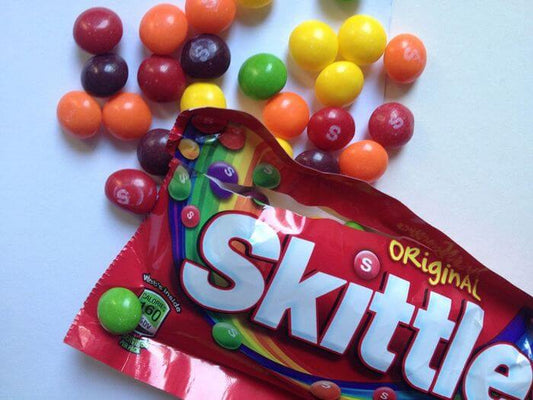What is the first thing you do when you are handed a pack of skittles? To most kids, probably a scream of delight — Skittles! To some adults: consume the entire pack and then comment about how harmful the sugar content must be.
However, for people guided by a religious or cultural lifestyle, the first thing they would do is scrutinise the label to ensure it adheres to their dietary requirements.
While companies like Chewwies are dedicated to producing vegan, sugar-free, and 100% halal-certified gummies, the same can not be said of all other popular children's favourites.
As a reminder, a halal diet is a food that is permissible for consumption according to Islamic dietary laws. It excludes alcohol, pork, foods that contain blood, meat from carnivores and animals that died before being slaughtered in the Islamic manner.
In this article, we will scrutinise Wrigley's Skittles while answering the big question, Are Skittles Halal?
Quick Answer: Not all Skittles are halal. There are both halal and non-halal Skittles flavours and products.
According to Statista, Skittles were the US favourite non-chocolate chewy candy, with 3.3 million pounds sold on average. They come in a wide variety of flavours such as sour, tropical, summer splash, wild berry, and Brightside.
Until 2010, the original recipe of Skittles was not halal as it had gelatin in it. However, Wrigley removed gelatin from Skittles candy in 2010 due to the rising concern of animal cruelty.
Skittles Ingredients
The main ingredients found in all Skittles products are:
Citric Acid
Natural or synthetic citric acid is an ingredient that adds tartness, improves flavour, and preserves ingredients in hard candies. It is naturally found in citrus fruits and is halal.

Tapioca dextrin
Commonly known as tapioca starch or tapioca flour, tapioca dextrin is a starch extract from cassava roots. It acts as an adhesive coating in Skittles and is halal.
Corn Syrup
Corn syrup is made from cornstarch, and it prevents the formation of sugar crystals in Skittles. It also adds volume, softens, and helps give the candy a smooth texture. Corn syrup is halal.
Modified corn starch
Modified corn starch is the gelling component that gives Skittles its gumminess. It is an emulsifier derived from corn (maize) and thus is halal.

Carnauba Wax
Carnauba wax gives Skittles it's shiny and attractive coating. It also prevents the candy from melting. It is commonly known as Brazil wax and is naturally found in the fronds of carnauba palm. Carnauba wax is halal.
Sodium Citrate
Sodium citrate is the sodium salt of citric acid. It gives some flavour of Skittles an authentic basic sour taste, improves tartness, and is used as a preservative. Sodium citrate is halal.
Hydrogenated Palm kernel oil
Palm kernel oil gives Skittles its gummy, chewy, and stretchy feel. It is an edible plant oil obtained from the kernel of oil palm. Palm kernel oil is halal.
Colours
Skittles use petroleum-based colourants: Red 40 Lake, Blue 1 Lake, Yellow 5 Lake, Yellow 6 Lake, Titanium dioxide, Red 40, Yellow 6, and Blue 1.
Natural and Artificial Flavours
The details of flavours are typically protected under law. Although the original Skittles is halal, it is best to read the label on other flavours and products, as they sometimes switch up the ingredients.
Below is a list of all Skittles products and flavours on the company’s website, including their halal status:
Halal Skittles
All halal Skittles contain; Sugar, corn syrup, hydrogenated palm kernel oil, citric acid, tapioca dextrin, modified corn starch, natural and artificial flavours, colours, sodium citrate, and carnauba wax. They are:
- Skittles Original
- Skittles Limited Pride Edition
- Skittles Wild Berry
- Skittles Sour
- Skittles Brightside
- Skittles Tropical
- Skittles Smoothies
Non-halal Skittles
Non-halal or haram Skittles gummies contain Corn syrup, sugar, modified corn starch, water, gelatin, citric acid, malic acid, natural and artificial flavours, sunflower oil, colours, and carnauba wax.
Skittles gummies are not halal because they contain gelatin.
Gelatin is a protein gotten by boiling the skin, tendon, ligament, and bones of animals with water. It is commonly sourced from pigs and, for this reason, is unsuitable for Muslims.
Below are the flavours and products of Skittles that are not halal:
- Skittles Wild Berry Gummies
- Skittles Original Gummies
- Skittles Squishy Clouds
Conclusion: All Skittles are halal, except Skittles Wild Berry Gummies, Skittles Original Gummies, and Squishy Clouds, which all contain pig-based gelatin.
Alternatives to Skittles
Skittles halal status is not the only reason you should actively consider an alternative.
The bite-sized fruit-flavoured chewy candies have no nutritional value and were ranked by DeFazio as one of the worst non-chocolate candy options.
A pack of Skittles contain 47 grams of sugar, nine different artificial colours, and hydrogenated palm kernel oil (trans fat). Trans fat is the worst kind of fat for your body and can be lethal to your health.

Below is the ultimate Skittle alternative you have been looking for:
Chewwies Gummies
Chewwies is a healthy, all-natural alternative to Skittles. Each pack is free from sugar, gelatine, alcohol, gluten, dairy, allergens, artificial colours, flavours and preservatives.
Flavours include:
All Chewwies products are suitable for vegans, vegetarian, halal and kosher certified—the only way you can pamper your teeth and still have peace of mind.
Click here for healthy gummies filled with dietary requirements suitable for all ages.
FAQ
Are Skittles halal?
There are halal and non-halal Skittles depending on the ingredients they contain. Non-halal Skittles contain gelatin.
What candy can Muslims eat?
Muslims can eat all kinds of candies that don’t contain pig-based gelatin.
Some Skittles contain gelatin in them?
Some Skittles contain gelatin, a pig-derived protein. The ones that don't contain gelatin usually contain vegetable oil, cornstarch, natural and artificial flavours and similar ingredients.


